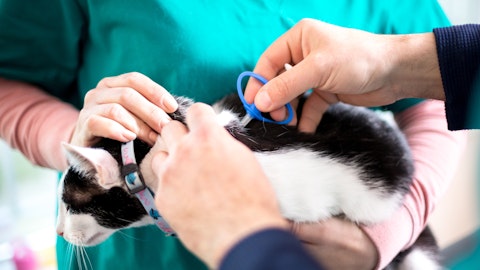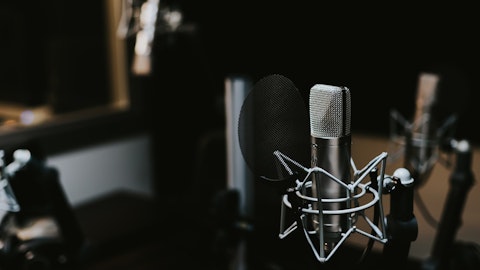Warren Kruger: They make so many other products and they just make so many other products. They make bins and crates and Coke crates, and we focus on pallets. I they are more expensive than we are. We really are focused on the recycled nature of our product. So historically, they are higher priced than us, which gives us a competitive advantage. And we do compete some time on price. Cabka is a very — they are a tough competitor, and they have products that compete with us. Decade Products up in Michigan has a couple of pallets that they manufacture. So we do have some competition. But what we have when someone says, “I need 30,000 plus, and I need them right away.” We have the capacity and the ability to do that. And where a barrier to entry in our business, it is just the capital costs.
You can’t afford to spend — buy a couple of machines, spend $6 million and just have a waiting around for product. We have done that because we have another 13 machines that are working. So we can be prepared to take someone. We bid on something this week that was a 140,000 units a year. And the guy said, ”Your $13 is too high.” And I said, ”You know what? I got to make money.” So I hope you find someone else to produce it on a 30 ton machine that costs $3 million. Because it is real. This is not a game. We got to make money.
Unidentified Analyst: That’s great. And then I guess just kind of maybe last one on kind of competitive landscape. I mean, would you say that — I mean, I don’t kind of been to your operations and they are very impressive. Would you say, you guys take down kind of lower cost operations? They’d be giving you focus on maybe fewer product lines versus some of the competitors in the U.S., and such as new can you can manufacture higher quality pallets at a cheaper price, and — yes?
Warren Kruger: I may not have understood totally your question.
Unidentified Analyst: Do you think your cost of manufacturing pallets is lower than your competition is because you do higher volume or you just focus on fewer product SKUs or something like that?
Warren Kruger: We have always focused on — I wish that — and perhaps we can do a better job of communicating the size of our recycling operation. But we probably use 60 million pound, 70 million pound of plastic a year right now, and we process a lot of that ourselves. So we have B-B lines, making big plastic B-Bs 24 hours a day and we grind, we probably grind 1 million old pallets that we buy back from people in the marketplace and so forth, we buy back. So we’re grinding these things up and we’ve been making pallets a little B-Bs and then producing again. So it’s a barrier to entry for someone who says, “Well, I can do it just as cheap.” Well, maybe so, but we’ve been doing this for 20 years and we know how to grind 30, 40, 50 pound pallets and make something out of it and it’s our own equipment.
We’re not outsourcing it to someone else. And it may cost $0.20 a pound for someone to B-B product out in the marketplace. On a 40 pound product, it’s $8 and it’s not costing us $8 to B-B our product because we own the equipment.
Unidentified Analyst: And I guess maybe last thing is, could you maybe just talk through the — I guess the sales growth? I mean, I think we’ve spoken maybe offline about it, but just like to kind of better understand for people into the last, like four quarters revenue had been down. I think there were some change in kind of how you were buying pallets or something like that. But maybe you could just talk through that. Obviously gross margins were phenomenal recently. But maybe just talk through sales, maybe you could also touch on, I guess you did 61 million revenue last year. It sounds like maybe you guys could beat that this year or just kind of put a high level?





